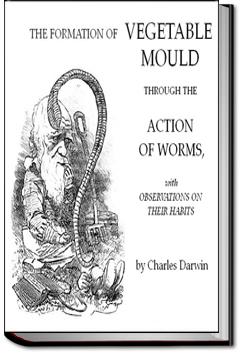UNLIMITED Audiobooks and eBooks
Over 40,000 books & works on all major devices
Get ALL YOU CAN for FREE for 30 days!
The Formation of Vegetable Mould
Charles Darwin
Book Overview:
Charles Darwin LL.B F.R.S was the discoverer of evolution and argued the role of "natural selection" in directing the evolution of species. Darwin also had an interest in the formation of soils (moulds) that began relatively early in his life, with a paper "On the Formation of Vegetable Moulds" delivered to the Geological Society of London.
Charles Darwin LL.B F.R.S was the discoverer of evolution and argued the role of "natural selection" in directing the evolution of species. Darwin also had an interest in the formation of soils (moulds) that began relatively early in his life, with a paper "On the Formation of Vegetable Moulds" delivered to the Geological Society of London.
How does All You Can Books work?
All You Can Books gives you UNLIMITED access to over 40,000 Audiobooks, eBooks, and Foreign Language courses. Download as many audiobooks, ebooks, language audio courses, and language e-workbooks as you want during the FREE trial and it's all yours to keep even if you cancel during the FREE trial. The service works on any major device including computers, smartphones, music players, e-readers, and tablets. You can try the service for FREE for 30 days then it's just $19.99 per month after that. So for the price everyone else charges for just 1 book, we offer you UNLIMITED audio books, e-books and language courses to download and enjoy as you please. No restrictions.
From the secretion with which the leaves are moistened being alkaline, an. . . Read More
Try now for FREE!

"Love your service - thanks so much for what you do!"
- Customer Cathryn Mazer
"I did not realize that you would have so many audio books I would enjoy"
- Customer Sharon Morrison
"For all my fellow Audio Book & E-Book regulars:
This is about as close to nirvana as I have found!"
- Twitter post from @bobbyekat



Community Reviews
great read
Darwin’s words, as usual, is stimulating and totally enjoyable. The information is dense but very clear and totally understandable. A book you can enjoy.
I tried to power through the end but it was just so boring. Lol. Scientific bit reading chapters on worm gizzards and how much dirt gets excavated by worms was dry. Good science, not the best read for pleasure. First couple chapters were entertaining because they focused on worm behavior and anatomy
Solucanlar hakkında yazılan en önemli hem deneysel hem de akademik bir kitap. Solucanlar dünyanın en önemli canlılarından birisi. Alışkanlıkları, Toprak ile ilişkisi, jeoloji-arkeoloji ile ilişkisi gibi konuları detaylıca anlatıyor Darwin. Biyoloji merakı, solucan merakı olanların okuması tavsiye ed
Worms have always fascinated me, but I haven’t read anything on them. I was just a casual obsessive, and did my best to make their lives great in my yard. That said, I really loved this.
Lastige woordenschat maar heel leuk om te lezen, zeer aandoenlijke experimenten.
Darwin’s little book on earthworms was the last of his scientific works, published in the year before his death in 1882 and more than 20 years after the great work, On the Origin of Species. The Formation of Vegetable Mould has an autumnal feeling; much of it is based on observations and experiments
I learnt about this work from R. Dawkins and was quite courious what Darwin had to tell us about those ubiquitous creatures: earth-worms. Darwin was an expert on long-term phenomena: he discovered evolution and was fascinated by tectonics. This is another phenomenon: worms forming mould, changing ro
This is one of Darwin's more obscure works, and as such I think it gives a special measure of the man's calibre as a scientist and observer. On the one hand, it is all of a piece with his Lyellian gradualism to show what lowly earthworms can achieve across millennia of small-scale vomiting. On the o